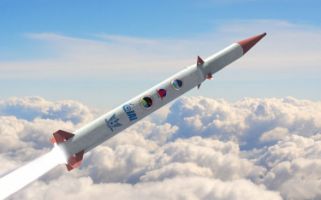The Future of the Israeli Defense Industry to 2024 - Defense Expenditure Anticipated to Be $130.3 Billion, Driven by the Need to Secure Itself Against Potential Threats - ResearchAndMarkets.com
The "Future of the Israeli Defense Industry - Market Attractiveness, Competitive Landscape and Forecasts to 2024" report has been added to ResearchAndMarkets.com's offering.
This report offers detailed analysis of the Israeli defense industry with market size forecasts covering the next five years. This report will also analyze factors that influence demand for the industry, key market trends, and challenges faced by industry participants.
Select Report Findings
- Israel's defense expenditure as a percentage of its GDP is anticipated to increase to an average of 4.5% over the forecast period. The Israeli defense budget, which stands at about US$17.6 billion in 2019.
- Between 2015 and 2019, the country's capital expenditure allocation stood at an average of 52.1% of the total defense budget, and is expected to increase slightly to an average of 52.6% over the forecast period. Overall, Israel is projected to spend a total of US$68.5 billion on the acquisition of military hardware between 2020 and 2024.
- The MoD is expected to invest in physical security of critical infrastructure, land-based C4ISR systems, infrastructure construction, Armored Personnel Carriers (APC), Multirole Fighter aircraft and Corvettes among others.
Israel's gross defense expenditure is anticipated to be US$130.3 billion cumulatively over the forecast period. Driven by the need to secure itself against potential threats from Iran, Saudi Arabia, Syria, and to a certain extent, Egypt, Israel has traditionally focused on developing a robust and aggressive defense posture.
Israel, remains surrounded by enemies and potential rivals and thus the country can ill afford to ignore security risks that have the potential to develop into a major security threat in future. As one of the largest defense markets in the Middle East, Israel allocated a gross budget of US$20.3 billion in 2019 and is likely to continue spending heavily on fortifying its defense and security apparatus.
During the period 2015 to 2019, the Israeli gross defense expenditure increased from US$18.1 billion in 2015 to US$20.3 billion in 2019, reflecting a CAGR of 2.90% over the analysis period. However, the Israeli defense expenditure is anticipated to grow rapidly from US$21.9 billion in 2020 to US$30.5 billion in 2024, registering a CAGR of 8.59% over the forecast period. The growth can be partially attributed to US$19 billion worth of military aid that the country is scheduled to receive from the US between 2019 and 2023, coupled with the country's plans to boost its investments in missile defense capability by about US$8-10 billion over the next decade.
Over the forecast period, Israeli defense expenditure as a percentage of GDP is anticipated to maintain an average of 4.5%, driven primarily by the Palestine conflict and the threats posed by the increasing influence of Iran and Hezbollah within neighboring Syria. Israel is expected to focus its expenditure on the procurement of fighter aircraft, missiles, corvettes, nuclear capable submarines, border security equipment, and communication systems, among others. These procurement plans are expected to maintain Israel's capital expenditure allocation at 52.5% even in 2024.
Israel has one of the most advanced defense industries worldwide and the country has consistently ranked among the top 10 defense exporting countries globally. During 2013-2017, Israel was ranked eighth on the list of the highest arms exporting countries, with a share of 2.9% of the global arms market. During the period 2014-2018 India was the single largest customer for Israeli defense equipment, accounting for 46.3% share of the Israeli defense exports. Azerbaijan and Vietnam were ranked as the second and third largest markets for Israeli defense equipment accounting for 17.4% and 8.5% respectively. Asia is the major defense market for Israeli defense equipment and accounts for a 78.7% share of Israeli defense exports during the period 2014-2018.
The Israeli government imported fighter aircraft, naval vessels, missiles, armored vehicles, engines, sensors, and artillery systems during 2014-2018. The US accounted for 50.8% of Israeli defense imports during this period, while India emerged as the single largest customer for Israeli defense goods with a share of 46.3%. The three key Israeli arms export categories were missiles, air defense systems and sensors.
In particular, the report provides an in-depth analysis of the following:
- The Israeli defense industry market size and drivers: detailed analysis of the Israeli defense industry during 2020-2024, including highlights of the demand drivers and growth stimulators for the industry. It also provides a snapshot of the country's expenditure and modernization patterns
- Budget allocation and key challenges: insights into procurement schedules formulated within the country and a breakdown of the defense budget with respect to the army, navy, and air force. It also details the key challenges faced by defense market participants within the country
- Porter's Five Force analysis of the Israeli defense industry: analysis of the market characteristics by determining the bargaining power of suppliers, bargaining power of buyers, threat of substitution, intensity of rivalry, and barriers to entry
- Import and Export Dynamics: analysis of prevalent trends in the country's imports and exports over the last five years
- Market opportunities: details of the top five defense investment opportunities over the next 10 years
- Competitive landscape and strategic insights: analysis of the competitive landscape of the Israeli defense industry. It provides an overview of key players, together with insights such as key alliances, strategic initiatives, and a brief financial analysis
Companies Mentioned
- General Dynamics
- Navistar Defense
- Lockheed Martin
- Raytheon
- Boeing
- Rafael Advanced Defense Systems
- Israel Aerospace Industries (IAI)
- Elta Systems
- Israel Shipyards
- Elbit Systems
- Elisra Systems
- IMI Systems
- TSG IT Advanced Systems Ltd.
- Plasan
- SimiGon
For more information about this report visit https://www.researchandmarkets.com/r/2xink8
View source version on businesswire.com: https://www.businesswire.com/news/home/20190520005651/en/





